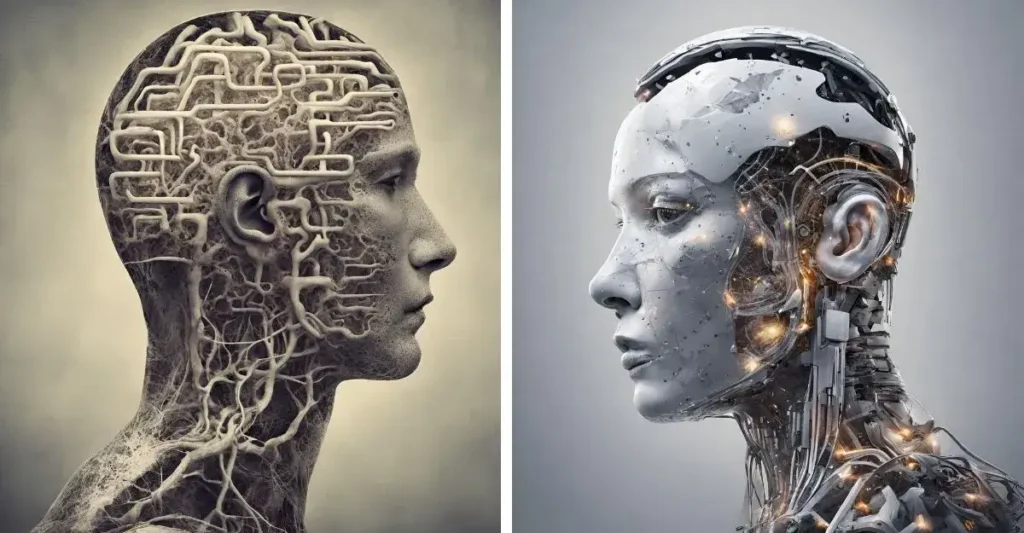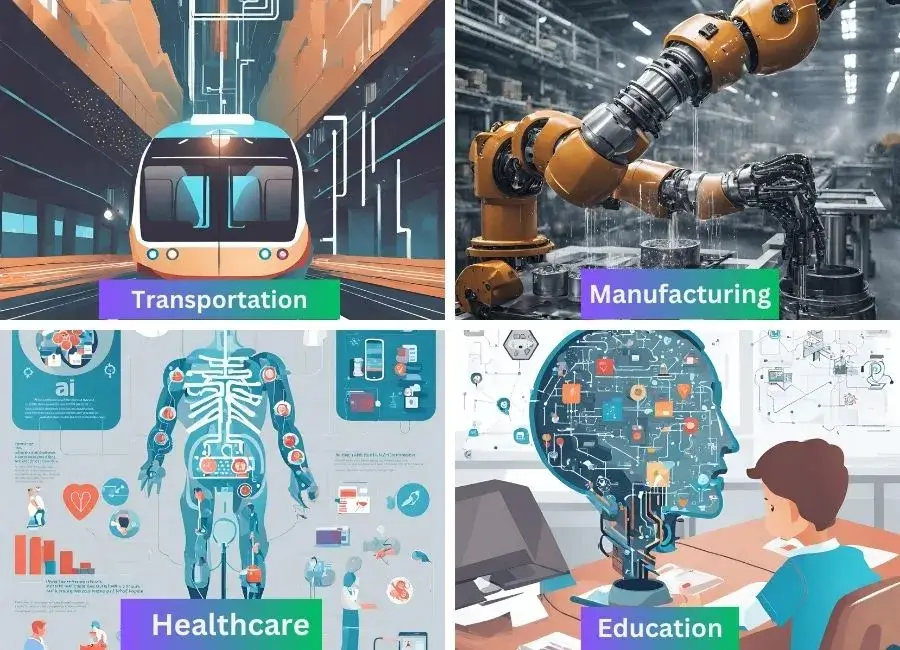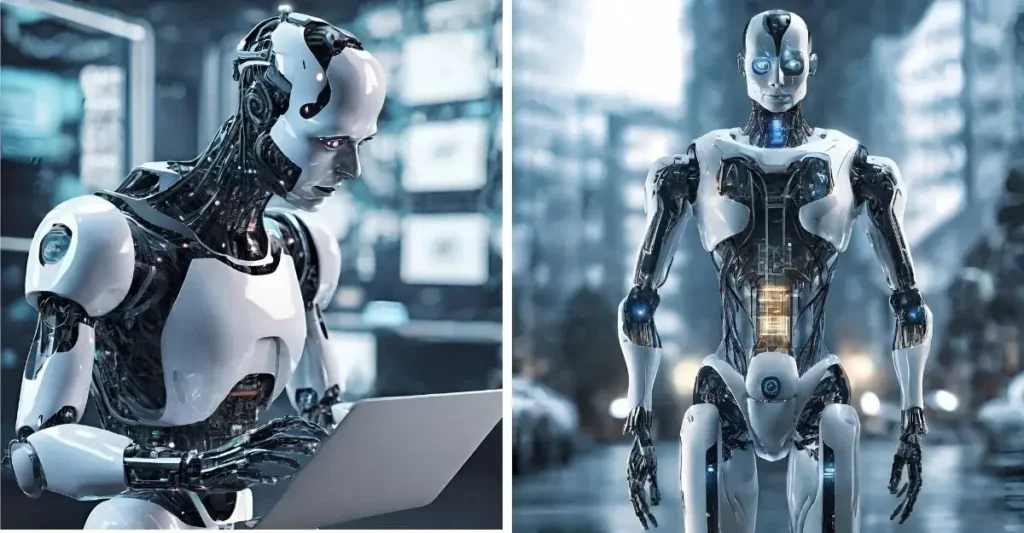It cannot be certain that artificial intelligence can ever capture human intelligence because it is not Sanu who has created AI. But in today’s era, the power of humans and both of them is very high.
Humans are moving forward very fast due to which it has become very necessary for them to use the eye, due to which they have to introduce new technologies today.
It plays an important role in both good and bad matters because the right or wrong use of technology depends on our hands. If we are using a technology in the right place then it will never harm us but if the technology is used wrong. If it is being used then it will definitely cause harm.
No one can really “take over the world.” The world is too vast and complex, even human leaders struggle to manage their own countries. If robots tried to take over the world, they’d face similar challenges.
They’d run out of resources, struggle to control areas, and face resistance from all directions. The idea of world domination is a fantasy from the past and not something that’s realistic for anyone, ever,
Artificial Intelligence Role in Our World:
AI systems are tools created and controlled by humans, and they function based on the rules and objectives set by their human creators. The development and deployment of AI are subject to strict ethical and safety considerations, and there is ongoing research and development to ensure that AI systems align with human values and interests.
The focus of AI development is on creating beneficial and responsible technologies that assist humans rather than harm them. So, while AI can bring about changes and challenges, it’s not on a path to autonomously take over humanity. It’s important for humans to continue to guide and regulate the development of AI to ensure it remains a helpful tool rather than a threat
Is AI really assisting human beings?
Artificial intelligence (AI) is a groundbreaking technology that’s changing the world. It’s already making a big difference in our daily lives.
AI is helping organizations, governments, and communities improve how they work together to make the world better. It’s solving important problems we face in society. Let’s look at some of the exciting ways AI is being used for good.
The Danger of Artificial Intelligence:
Elon Musk warned about this: at a top robotics company in Japan this week in 2023 4 AI robots which being developed for military /defence applications for the nation. the robot killed 29 humans in the lab in which they were trained. and they did it by shooting guns filled with metal bullets in it. They are known as metal bullets
The scariest part is that the lab workers deactivated 2 of the robots and took apart the third one but the fourth robot began restoring itself and somehow connecting to the orbiting satellite to download all the information about how to rebuild itself and restore it without any resistance or even more strongly than before they before …
Mark my words “ AI is far more dangerous than we actually think”
Will robots take over the world in 2050?
Life in 2050 will be quite different from today. Technology will advance, and robots will be a common part of our daily lives. They’ll help with various tasks, like cleaning and driving. Some worry that robots might become a problem, but it depends on how we use them.
Here are some predictions for 2050:
- Robots in Everyday Tasks: Robots will assist us with many tasks, such as cleaning our homes, driving our cars, and even performing surgery.
- Smarter Robots: Robots will become more intelligent and independent. They’ll learn from their surroundings and make decisions on their own.
- Robots as Companions: Robots will become integrated into our lives, acting as companions, assistants, and even friends.
While some may fear robots, I believe they can improve our lives. They can make us more efficient and give us more time for what’s important.
As for robots taking over the world, I don’t think it’s likely. Robots are tools, and their impact depends on how we use them. If we use them wisely, they can help create a better world. But if we misuse them, they could become a serious threat.
The future of robots is in our hands. Let’s use them wisely
AI vs human brain who is more powerful?

- AI can process vast amounts of data with incredible speed and accuracy.
- AI can perform specific tasks, such as complex calculations, data analysis, and pattern recognition, more efficiently than humans.
- AI can work continuously without getting tired or making mistakes due to fatigue.
Human Brain:
- The human brain is unmatched in its ability to handle complex, creative, and flexible thinking.
- It excels in tasks that involve emotional intelligence, empathy, and understanding of context and nuance.
- Humans have consciousness, self-awareness, and the capacity for moral and ethical decision-making.
In essence, AI is exceptionally powerful in tasks that involve data and pattern recognition, while the human brain’s strength lies in its adaptability, creativity, and understanding of emotions and complex situations. The two complement each other, and their power depends on the context and the specific task at hand.
What industries will AI change?

AI, or artificial intelligence, is changing many industries. It’s a type of technology that helps computers do smart things by learning from data. Here’s how AI is making a difference in various areas:
AI in Transportation: AI is set to change how we travel. Self-driving cars and AI travel planners are part of it. Even though self-driving cars are not perfect yet, they will drive us around in the future.
AI in Manufacturing: In factories, AI has been used for a long time. Robots with AI can work alongside people, and do some tasks, and sensors can keep machines running smoothly.
AI in Healthcare: AI helps doctors find diseases faster and better. It speeds up finding new medicines and even keeps an eye on patients using virtual nursing assistants.
AI in Education: AI in education changes how we learn. It uses technology like chatbot telegram bots and other AI tools to understand how students are doing and helps them learn better.
AI in Media: AI helps in journalism. It can write news stories, but there are questions about how it might change journalism.
AI in Agriculture: Farmers use AI to monitor crops and animals, manage resources like water and fertilizer more efficiently, and predict crop yields.
AI in Finance: AI is used for fraud detection, algorithmic trading, and personal finance apps that offer investment advice based on your financial goals.
AI in Retail: Retailers use Artificial Intelligence to recommend products to customers, optimize inventory management, and provide chatbots for customer support.
AI in Energy: The energy sector uses Artificial Intelligence to improve the efficiency of power generation, monitor equipment for maintenance, and predict energy consumption patterns.
AI in Entertainment: In the entertainment industry, AI is used for content recommendations on streaming platforms and even for creating special effects in movies and video games.
AI in Real Estate: Real estate companies use Artificial Intelligence to analyze property values, recommend listings to potential buyers, and automate customer inquiries.
AI in Customer Service: When you talk to a computer for help, that’s Artificial Intelligence in customer service. It helps companies understand what customers need and want. AI is making life different in many ways, and it’s here to stay. It’s like a tool that helps us do things better in lots of industries.
Can AI change human intelligence?
While the idea of Artificial Intelligence changing our lives is both exciting and frightening, we should take a closer look at how AI and humans interact. Let’s explore the different possibilities, consequences, and even some potential positives in the debate about whether AI will outperform humans and make us irrelevant. Here are some points:
1. Specific vs. General Intelligence:
- Artificial Intelligence systems are designed for specific tasks or domains. They excel at tasks like image recognition, language translation, and playing chess.
- Human: Humans possess general intelligence, which enables them to adapt to a wide range of tasks, learn new skills, and understand complex contexts.
2. Creativity and Imagination:
- Artificial Intelligence can generate content, such as art or music, based on patterns and data it has learned. For instance, AI-generated artwork and music compositions are gaining popularity.
- Human: Humans have the ability to think creatively, imagine new concepts, and produce original art, literature, and music that reflect emotions and unique perspectives.
3. Emotional Intelligence:
- Artificial Intelligence can analyze text sentiment and recognize emotions in facial expressions. Chatbots and virtual assistants, like Siri and Alexa, attempt to respond to human emotions.
- Human: Humans have a deep understanding of emotions, empathy, and the ability to build meaningful relationships. They can discern subtle emotional cues and respond appropriately in complex social situations.
Future of Artificial Intelligence:

AI research is happening in two areas: “reinforcement” learning, which deals with rewards and punishments, and generative adversarial networks (GAN), where computer algorithms create things by competing. For example, Google’s AlphaGo Zero is great at reinforcement learning, and GANs can make pictures or music by learning from topics like celebrities or types of music.
Artificial Intelligence is also going to have a big impact on making our cities better for the environment. Smart sensors can help cities be less crowded and polluted. For example, sensors on cars can send traffic data to predict and fix problems. This is just starting, but it will become more important in the future.
Why AI Taking Over Humanity Is Unlikely
The idea of Artificial Intelligence dominating the world is based on the belief that machines will become smarter than humans. Although AI has made progress, it still lacks human qualities like creativity, understanding emotions, and solving complex problems. These qualities are essential for making important decisions, and machines can’t match them.
The notion of machines taking over the world assumes that they have the desire and motivation to do so. But machines are not conscious beings; they don’t have self-awareness or feelings. They don’t want to take over the world or have any motives.
Moreover, Artificial Intelligence development is closely regulated, following strict ethical and legal rules. AI is meant to assist and improve human life, not replace it. Concerns about AI misuse are addressed through strong regulations and oversight.
It’s important to understand that AI is a vast field with many different technologies and applications. It’s unlikely that a single AI system or application could become so powerful that it takes over the world.
While the potential risks of Artificial Intelligence may seem distant and theoretical, we’re already seeing the impact of intelligent machines in our daily lives. It’s essential to address these risks before they become a real problem.
Conclusion
AI, or artificial intelligence, is a powerful tool created by humans. While it excels at specific tasks, it lacks the adaptability, creativity, and emotional understanding of humans. The idea of AI taking over the world is unlikely because machines lack consciousness, motivation, and human-like qualities.
AI plays a crucial role in various industries, from transportation and healthcare to entertainment and finance. Its impact depends on how we use it, and regulations ensure ethical development. Concerns about AI taking over humanity are mostly theoretical, as AI is designed to assist and improve human life, not replace it.
The future of Artificial Intelligence involves advancements in reinforcement learning and generative adversarial networks. AI can contribute to environmental improvements in cities, making them smarter and more efficient.
In short, Artificial Intelligence is helpful when used wisely, and it’s unlikely to take over the world because it has limits and rules to ensure it’s used ethically.
FAQ:
Can AI really take over the world like in the movies?
Who is more powerful: AI or the human brain?
Is AI really assisting human beings?
Will robots take over the world in 2050?
What industries will AI change?
Can AI change human intelligence?
Why is AI taking over humanity unlikely?
What is the full form of AI?
What are the factors influencing the debate on AI taking over human intelligence?
What is Artificial Intelligence (AI)?
What are the different types of AI?
